U bent hier
ICT
After a fiery finale, the Delta rocket family now belongs to history

Enlarge / In this video frame from ULA's live broadcast, three RS-68A engines power the Delta IV Heavy rocket into the sky over Cape Canaveral, Florida. (credit: United Launch Alliance)
The final flight of United Launch Alliance's Delta IV Heavy rocket took off Tuesday from Cape Canaveral, Florida, with a classified spy satellite for the National Reconnaissance Office.
The Delta IV Heavy, one of the world's most powerful rockets, launched for the 16th and final time Tuesday. It was the 45th and last flight of a Delta IV launcher and the final rocket named Delta to ever launch, ending a string of 389 missions dating back to 1960.
United Launch Alliance (ULA) tried to launch this rocket on March 28 but aborted the countdown about four minutes prior to liftoff due to trouble with nitrogen pumps at an off-site facility at Cape Canaveral. The nitrogen is necessary for purging parts inside the Delta IV rocket before launch, reducing the risk of a fire or explosion during the countdown.
RIP Peter Higgs, who laid foundation for the Higgs boson in the 1960s

Enlarge / A visibly emotional Peter Higgs was present when CERN announced Higgs boson discovery in July 2012. (credit: University of Edinburgh )
Peter Higgs, the shy, somewhat reclusive physicist who won a Nobel Prize for his theoretical work on how the Higgs boson gives elementary particles their mass, has died at the age of 94. According to a statement from the University of Edinburgh, the physicist passed "peacefully at home on Monday 8 April following a short illness."
“Besides his outstanding contributions to particle physics, Peter was a very special person, a man of rare modesty, a great teacher and someone who explained physics in a very simple and profound way," Fabiola Gianotti, director general at CERN and former leader of one of the experiments that helped discover the Higgs particle in 2012, told The Guardian. "An important piece of CERN’s history and accomplishments is linked to him. I am very saddened, and I will miss him sorely.”
The Higgs boson is a manifestation of the Higgs field, an invisible entity that pervades the Universe. Interactions between the Higgs field and particles help provide particles with mass, with particles that interact more strongly having larger masses. The Standard Model of Particle Physics describes the fundamental particles that make up all matter, like quarks and electrons, as well as the particles that mediate their interactions through forces like electromagnetism and the weak force. Back in the 1960s, theorists extended the model to incorporate what has become known as the Higgs mechanism, which provides many of the particles with mass. One consequence of the Standard Model's version of the Higgs boson is that there should be a force-carrying particle, called a boson, associated with the Higgs field.
Elon Musk denies knowing who’s suing him to dodge defamation suit

Enlarge (credit: NurPhoto / Contributor | NurPhoto)
After Elon Musk was accused of defaming Ben Brody—a 22-year-old Jewish man falsely linked to a neo-Nazi brawl in tweets that Musk responded to last year—the owner of X (formerly Twitter) sat for a heated Zoom deposition where he repeatedly denied ever knowing who Brody was.
When Brody's attorney, Mark Bankston, asked Musk if he thought he ever did anything "wrong" to Brody, Musk replied, "I don't know Ben Brody."
"You're aware that Ben Brody is somebody who's sued you, right?" Bankston asked.
EPA seeks to cut “Cancer Alley” pollutants

Enlarge / An oil refinery in Louisiana. Facilities such as this have led to a proliferation of petrochemical plants in the area. (credit: Art Wager)
On Tuesday, the US Environmental Protection Agency announced new rules that are intended to cut emissions of two chemicals that have been linked to elevated incidence of cancer: ethylene oxide and chloroprene. While production and use of these chemicals takes place in a variety of locations, they're particularly associated with an area of petrochemical production in Louisiana that has become known as "Cancer Alley."
The new regulations would require chemical manufacturers to monitor the emissions at their facilities and take steps to repair any problems that result in elevated emissions. Despite extensive evidence linking these chemicals to elevated risk of cancer, industry groups are signaling their opposition to these regulations, and the EPA has seen two previous attempts at regulation set aside by courts.
Dangerous stuffThe two chemicals at issue are primarily used as intermediates in the manufacture of common products. Chloroprene, for example, is used for the production of neoprene, a synthetic rubber-like substance that's probably familiar from products like insulated sleeves and wetsuits. It's a four-carbon chain with two double-bonds that allow for polymerization and an attached chlorine that alters its chemical properties.
“Google Vids” is Google’s fourth big productivity app for Workspace
-
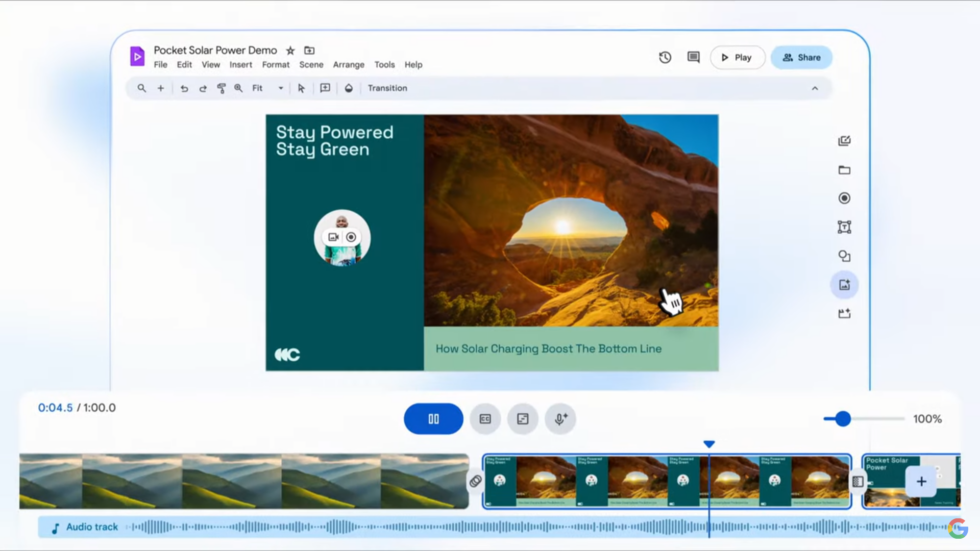
Is that Google Slides? Nope it's Google Vids, the new video editor that seems to just make souped-up slideshows. [credit: Google ]
If you had asked me before what Google's video editor app was, I would say "YouTube Studio," but now Google Workspace has a new productivity app called "Google Vids." Normally a video editor is considered a secondary application in many productivity suites, but Google apparently imagines Vids as a major pillar of Workspace, saying Vids is an "all-in-one video creation app for work that will sit alongside Docs, Sheets and Slides." So that's editors for documents, spreadsheets, presentations, and videos?
Google's demo of the new video editor pitches the product not for YouTube videos or films, but more of as a corporate super slideshow for things like training materials or product demos. Really this "video editor" almost looks like it could completely replace Google Slides since the interface is just Slides but with a video timeline instead of a slideshow timeline.
Google's example video creates a "sales training video" that actually starts with a Slides presentation as the basic outline. You start with an outline editor, where each slideshow page gets its own major section. Google then has video "styles" you can pick from, which all seem very Powerpoint-y with a big title, subheading, and a slot for some kind of video. Google then wants you to write a script and either read it yourself or have a text-to-speech voice read the script. A "stock media" library lets you fill in some of those video slots with generic corporate imagery like a video of a sunset, choose background music, and use a few pictures. You can also fire up your webcam and record something, sort of like a pre-canned Zoom meeting. After that it's a lot of the usual Google productivity app features: real-time editing collaboration with visible mouse cursors from each participant and a stream of comments.
Thousands of LG TVs exposed to the world. Here’s how to ensure yours isn’t one.

Enlarge (credit: Getty Images)
As many as 91,000 LG TVs face the risk of being commandeered unless they receive a just-released security update patching four critical vulnerabilities discovered late last year.
The vulnerabilities are found in four LG TV models that collectively comprise slightly more than 88,000 units around the world, according to results returned by the Shodan search engine for Internet-connected devices. The vast majority of those units are located in South Korea, followed by Hong Kong, the US, Sweden, and Finland. The models are:
- LG43UM7000PLA running webOS 4.9.7 - 5.30.40
- OLED55CXPUA running webOS 5.5.0 - 04.50.51
- OLED48C1PUB running webOS 6.3.3-442 (kisscurl-kinglake) - 03.36.50
- OLED55A23LA running webOS 7.3.1-43 (mullet-mebin) - 03.33.85
Starting Wednesday, updates are available through these devices’ settings menu.
Report details how Russia obtains Starlink terminals for war in Ukraine
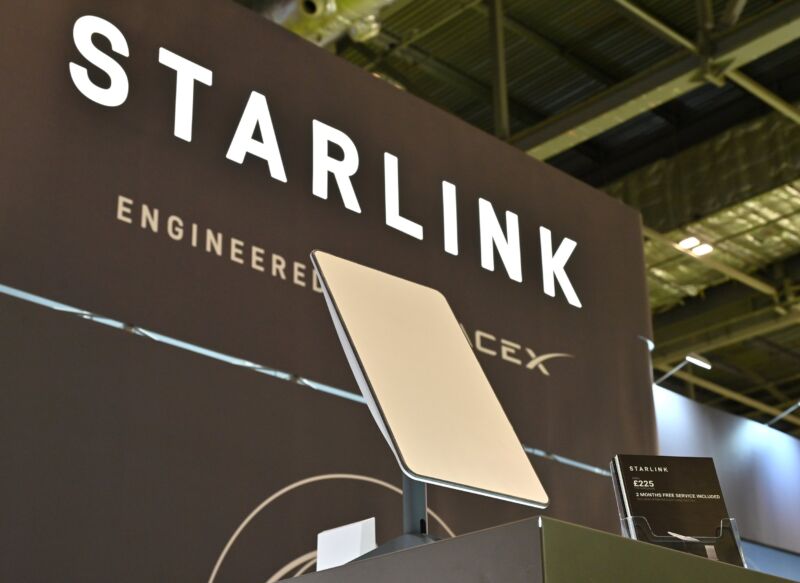
Enlarge / A Starlink terminal at the Everything Electric London conference on March 28, 2024 in England. (credit: Getty Images | John Keeble )
A report published today describes how Russia obtained Starlink terminals for its war in Ukraine despite US sanctions and SpaceX's insistence that Russia hasn't bought the terminals either directly or indirectly.
The Wall Street Journal report describes black market sales to Russians and a Sudanese paramilitary group called the Rapid Support Forces (RSF). US Secretary of State Antony Blinken recently determined that the Rapid Support Forces and allied militias committed war crimes and are responsible for ethnic cleansing in Darfur.
The WSJ said it "tracked Starlink sales on numerous Russian online retail platforms," "interviewed Russian and Sudanese middlemen and resellers, and followed Russian volunteer groups that deliver SpaceX hardware to the front line."
Elon Musk: AI will be smarter than any human around the end of next year
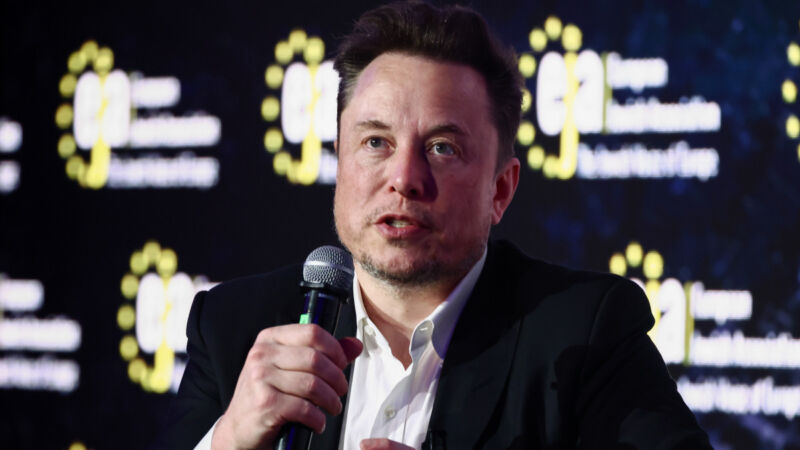
Enlarge / Elon Musk, owner of Tesla and the X (formerly Twitter) platform on January 22, 2024. (credit: Getty Images)
On Monday, Tesla CEO Elon Musk predicted the imminent rise in AI superintelligence during a live interview streamed on the social media platform X. "My guess is we'll have AI smarter than any one human probably around the end of next year," Musk said in his conversation with hedge fund manager Nicolai Tangen.
Just prior to that, Tangen had asked Musk, "What's your take on where we are in the AI race just now?" Musk told Tangen that AI "is the fastest advancing technology I've seen of any kind, and I've seen a lot of technology." He described computers dedicated to AI increasing in capability by "a factor of 10 every year, if not every six to nine months."
Musk made the prediction with an asterisk, saying that shortages of AI chips and high AI power demands could limit AI's capability until those issues are resolved. “Last year, it was chip-constrained,” Musk told Tangen. “People could not get enough Nvidia chips. This year, it’s transitioning to a voltage transformer supply. In a year or two, it’s just electricity supply.”
Intel is investigating game crashes on top-end Core i9 desktop CPUs
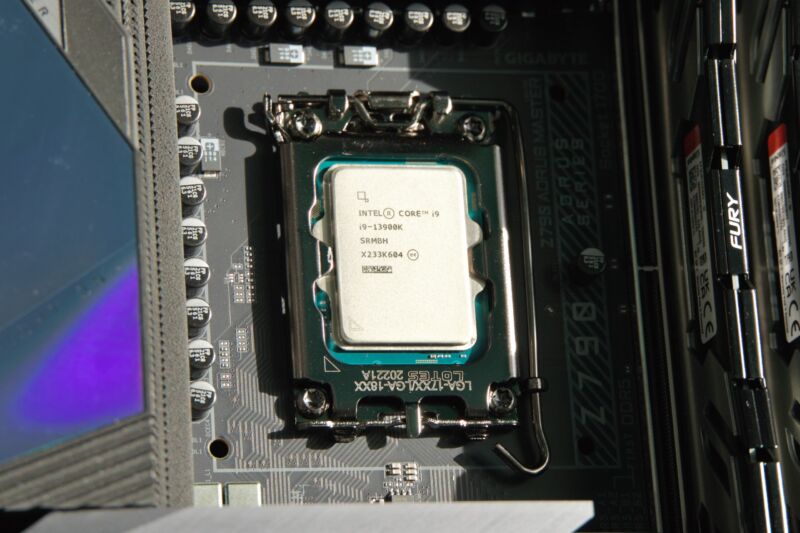
Enlarge / Intel's high-end Core i9-13900K and 14900K are reportedly having crashing problems in some games. (credit: Andrew Cunningham)
If you own a recent high-end Intel desktop CPU and you've been running into weird game crashes lately, you're not alone.
Scattered reports from Core i9-13900K and i9-14900K users over the last couple of months have pointed to processor power usage as a possible source of crashes even in relatively undemanding games like Fortnite. Games like Hogwarts Legacy, Remnant 2, Alan Wake 2, Horizon: Zero Dawn, The Last of Us Part 1, and Outpost: Infinity Siege have also reportedly been affected; the problem primarily seems to affect titles made with Epic's Unreal Engine. Intel said in a statement to ZDNet Korea (via The Verge) that it's looking into the problems, escalating it from an "isolated issue" to something that may be more widespread and could require a more systemic fix.
Related CPUs like the i9-13900KF, i9-14900KF, i9-13900KS, and i9-14900KS may be affected, too, since they're all the same basic silicon. Some user reports have also indicated that the i7-13700K and i7-14700K series may also be affected.
2,000 senior women win “biggest victory possible” in landmark climate case
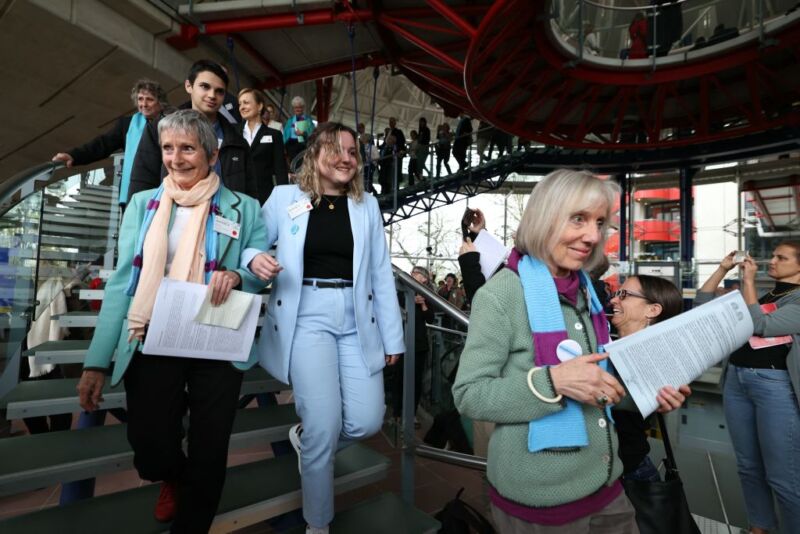
Enlarge / Members of Swiss association Senior Women for Climate Protection react after the announcement of decisions after a hearing of the European Court of Human Rights (ECHR) to decide in three separate cases if states are doing enough in the face of global warming in rulings that could force them to do more, in Strasbourg, eastern France, on April 9, 2024. (credit: FREDERICK FLORIN / Contributor | AFP)
More than 2,000 older Swiss women have won a landmark European case proving that government climate inaction violates human rights.
The European Court of Human Rights (ECHR) ruled Tuesday that Switzerland had not acted urgently to achieve climate targets, leading victims, who are mostly in their 70s, to suffer physically and emotionally while potentially placed at risk of dying.
The women, part of a group called KlimaSeniorinnen (Senior Women for Climate Protection), filed the lawsuit nine years ago. They presented medical documents and scientific evidence that older women are more vulnerable to climate impacts, arguing that "their health and daily routines were affected" by Swiss heatwaves connected to climate change.
WordPress owner acquires Beeper, giving it two chat apps to rule them all
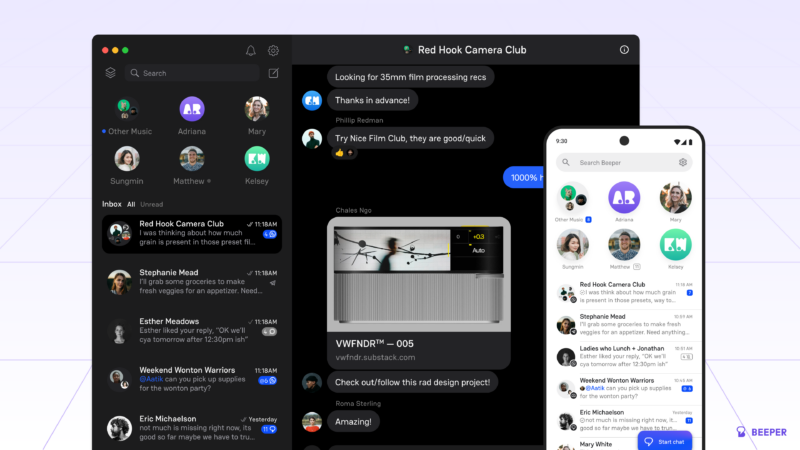
Enlarge / Beeper's new apps are now available, without waitlist, across nearly all mobile and desktop platforms.
Beeper, the multi-network messaging app that recently gave up on trying to engineer around Apple's walled-off iMessage service, has been acquired by Automattic, the company behind WordPress. It is now open to everyone and has a completely revamped Android app.
All of Beeper's workers will join Automattic and will continue operating as an independent team, according to a press release. Eric Migicovsky, creator of the Pebble smartwatch and co-founder of Beeper, will become Automattic's head of messaging. Beeper and Texts.com, acquired last year by Automattic, will work together.
Given that Texts.com provides a similar "all your chats in one place" function but also an iMessage bridge using an app you run on your own Apple computers, it's likely that Beeper and Texts will consolidate into one platform that more closely hews to the "all" part of the companies' mission statements.
Caribbean nation of Aruba backs itself up to Internet Archive

Enlarge / Divi Divi trees on a sandy beach in Aruba. (credit: Cavan Images via Getty)
Aruba has long been a special place for Stacy Argondizzo. For years, her family has vacationed on the tiny Caribbean Island every July. More recently it’s been more than just a place to take a break from her work as a digital archivist—becoming wholly a part of that work.
A project Argondizzo galvanized comes to full fruition this week. The Internet Archive is now home to the Aruba Collection, which hosts digitized versions of Aruba’s National Library, National Archives, and other institutions including an archaeology museum and the University of Aruba. The collection comprises 101,376 items so far—roughly one for each person who lives on the Island—including 40,000 documents, 60,000 images, and seven 3D objects.
Tesla settles Autopilot wrongful death suit, avoiding court trial
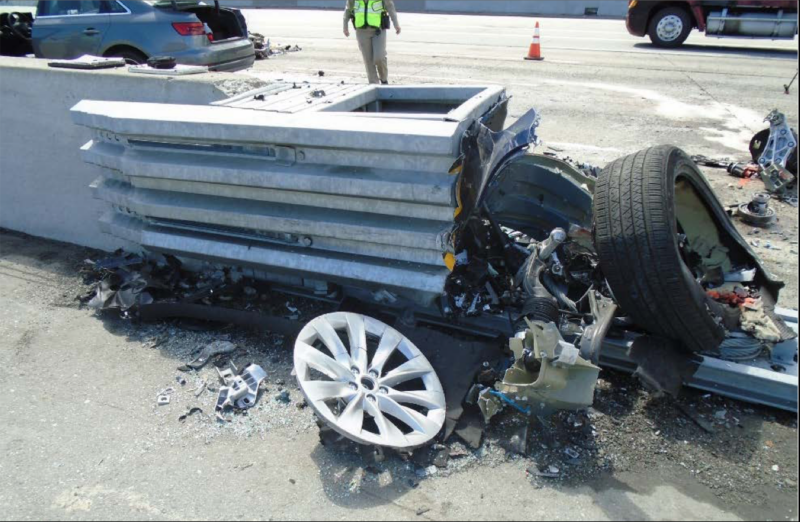
Enlarge / A photograph from the NTSB report into the crash. (credit: NTSB)
Yesterday, trial was due to begin in the case of Huang v. Tesla, a wrongful death lawsuit brought by the family of a man killed in his Tesla Model X in 2018. But the case will now not be heard by a judge—Tesla has settled with the family for an undisclosed sum.
Walter Huang was driving to work in his Model X on March 23, 2018, when his car drove headlong into a concrete divider at an exit on US Highway 101. Tesla's partially automated driving system, Autopilot, was active at the time, and Huang trusted it enough to play video games on his phone, despite having noticed that the car got confused at that particular intersection more than once.
The National Transportation Safety Board investigated Huang's death and published its findings in 2020. The NTSB found plenty of parties to blame. Tesla's misleading marketing of Autopilot, such as video interviews where the Tesla CEO operated the system without keeping his hands or eyes on the road, and a staged self-driving demonstration contributed to Huang's mistaken trust in Autopilot.
Moments of totality: How Ars experienced the eclipse

Enlarge / Baily's Beads are visible in this shot taken by Stephen Clark in Athens, Texas. (credit: Stephen Clark)
"And God said, Let there be light: and there was light. And God saw the light, that it was good: and God divided the light from the darkness. And God called the light Day, and the darkness he called Night. And the evening and the morning were the first day."
The steady rhythm of the night-day, dark-light progression is a phenomenon acknowledged in ancient sacred texts as a given. When it's interrupted, people take notice. In the days leading up to the eclipse, excitement within the Ars Orbiting HQ grew, and plans to experience the last total eclipse in the continental United States until 2045 were made. Here's what we saw across the country.
Kevin Purdy (watched from Buffalo, New York)-
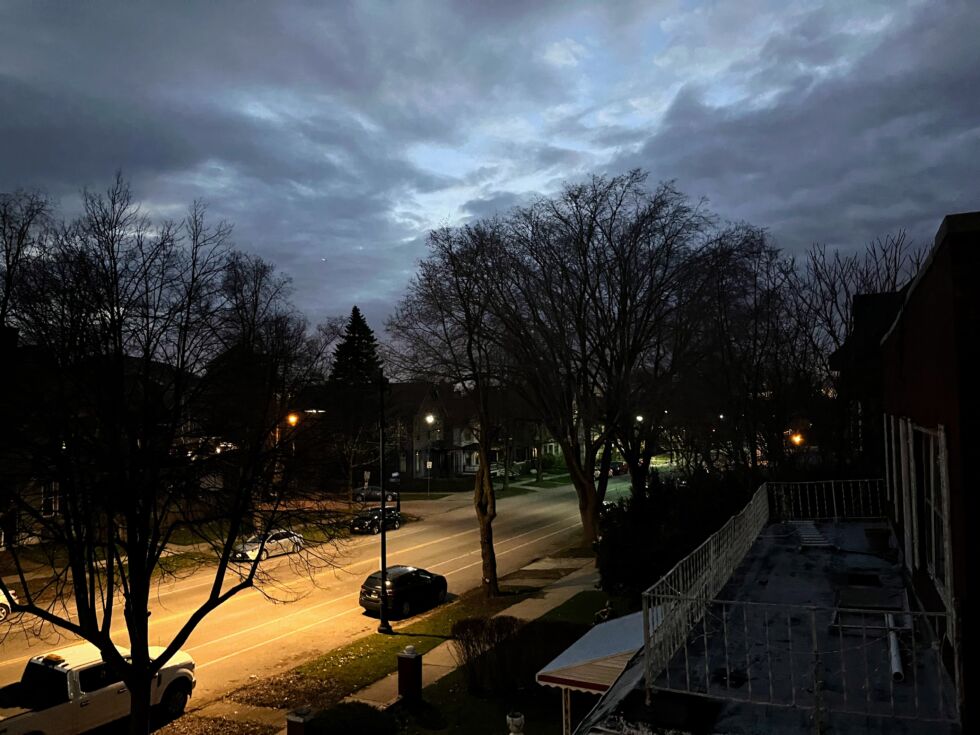
3:19 pm on April 8 in Buffalo overlooking Richmond Ave. near Symphony Circle. [credit: Kevin Purdy ]
Buffalo, New York, is a frequently passed-over city. Super Bowl victories, the shift away from Great Lakes shipping and American-made steel, being the second-largest city in a state that contains New York City: This city doesn’t get many breaks.
Teen’s vocal cords act like coin slot in worst-case ingestion accident

Enlarge (credit: Getty | Archive Photos)
Most of the time, when kids accidentally gulp down a non-edible object, it travels toward the stomach. In the best-case scenarios for these unfortunate events, it's a small, benign object that safely sees itself out in a day or two. But in the worst-case scenarios, it can go down an entirely different path.
That was the case for a poor teen in California, who somehow swallowed a quarter. The quarter didn’t head down the esophagus and toward the stomach, but veered into the airway, sliding passed the vocal cords like they were a vending-machine coin slot.

Radiographs of the chest (Panel A, postero- anterior view) and neck (Panel B, lateral view). Removal with optical forceps (Panel C and Video 1), and reinspection of ulceration (Panel D, asterisks) (credit: NEJM, Hsue and Patel, 2024)
In a clinical report published recently in the New England Journal of Medicine, doctors who treated the 14-year-old boy reported how they found—and later retrieved—the quarter from its unusual and dangerous resting place. Once it passed the vocal cords and the glottis, the coin got lodged in the subglottis, a small region between the vocal cords and the trachea.
MIT License text becomes viral “sad girl” piano ballad generated by AI
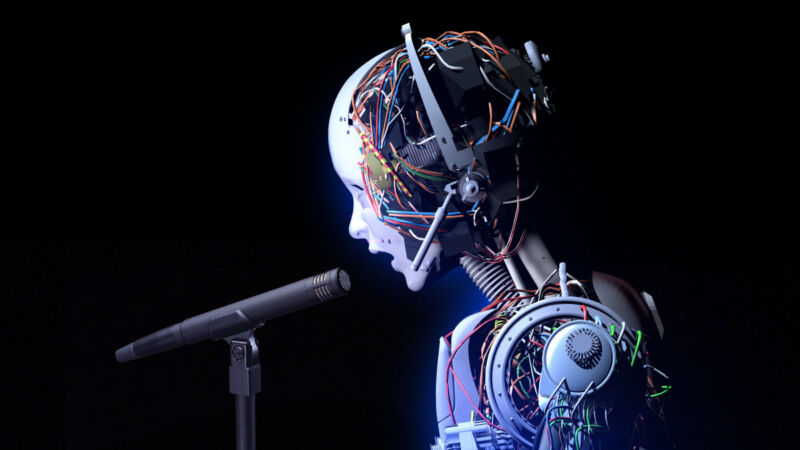
Enlarge (credit: Getty Images)
We've come a long way since primitive AI music generators in 2022. Today, AI tools like Suno.ai allow any series of words to become song lyrics, including inside jokes (as you'll see below). On Wednesday, prompt engineer Riley Goodside tweeted an AI-generated song created with the prompt "sad girl with piano performs the text of the MIT License," and it began to circulate widely in the AI community online.
The MIT License is a famous permissive software license created in the late 1980s, frequently used in open source projects. "My favorite part of this is ~1:25 it nails 'WARRANTIES OF MERCHANTABILITY' with a beautiful Imogen Heap-style glissando then immediately pronounces 'FITNESS' as 'fistiff,'" Goodside wrote on X.
Suno (which means "listen" in Hindi) was formed in 2023 in Cambridge, Massachusetts. It's the brainchild of Michael Shulman, Georg Kucsko, Martin Camacho, and Keenan Freyberg, who formerly worked at companies like Meta and TikTok. Suno has already attracted big-name partners, such as Microsoft, which announced the integration of an earlier version of the Suno engine into Bing Chat last December. Today, Suno is on v3 of its model, which can create temporally coherent two-minute songs in many different genres.
AI hardware company from Jony Ive, Sam Altman seeks $1 billion in funding
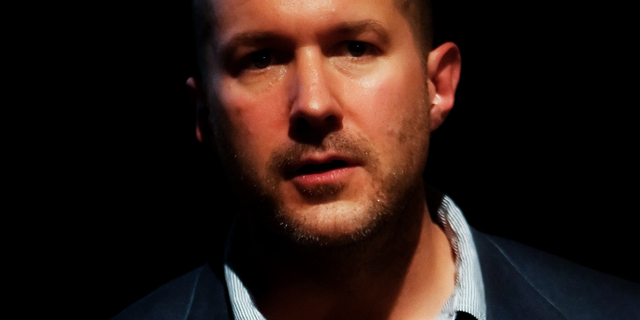
Jony Ive, the former Apple designer. (credit: Gary Cohen)
Former Apple design lead Jony Ive and current OpenAI CEO Sam Altman are seeking funding for a new company that will produce an "artificial intelligence-powered personal device," according to The Information's sources, who are said to be familiar with the plans.
The exact nature of the device is unknown, but it will not look anything like a smartphone, according to the sources. We first heard tell of this venture in the fall of 2023, but The Information's story reveals that talks are moving forward to get the company off the ground.
Ive and Altman hope to raise at least $1 billion for the new company. The complete list of potential funding sources they've spoken with is unknown, but The Information's sources say they are in talks with frequent OpenAI investor Thrive Capital as well as Emerson Collective, a venture capital firm founded by Laurene Powell Jobs.
FCC chair rejects call to impose Universal Service fees on broadband

Enlarge (credit: Getty Images | BernardaSv)
The Federal Communications Commission chair decided not to impose Universal Service fees on Internet service, rejecting arguments for new assessments to shore up an FCC fund that subsidizes broadband network expansions and provides discounts to low-income consumers.
The $8 billion-a-year Universal Service Fund (USF) pays for FCC programs such as Lifeline discounts and Rural Digital Opportunity Fund deployment grants for ISPs. Phone companies must pay a percentage of their revenue into the fund, and telcos generally pass those fees on to consumers with a "Universal Service" line item on telephone bills.
Imposing similar assessments on broadband could increase the Universal Service Fund's size and/or reduce the charges on phone service, spreading the burden more evenly across different types of telecommunications services. Some consumer advocates want the FCC to increase the fund in order to replace the Affordable Connectivity Program (ACP), a different government program that gives $30 monthly broadband discounts to people with low incomes but is about to run out of money because of inaction by Congress.
Critical takeover vulnerabilities in 92,000 D-Link devices under active exploitation

Enlarge (credit: Getty Images)
Hackers are actively exploiting a pair of recently discovered vulnerabilities to remotely commandeer network-attached storage devices manufactured by D-Link, researchers said Monday.
Roughly 92,000 devices are vulnerable to the remote takeover exploits, which can be remotely transmitted by sending malicious commands through simple HTTP traffic. The vulnerability came to light two weeks ago. The researcher said they were making the threat public because D-Link said it had no plans to patch the vulnerabilities, which are present only in end-of-life devices, meaning they are no longer supported by the manufacturer.
An ideal recipeOn Monday, researchers said their sensors began detecting active attempts to exploit the vulnerabilities starting over the weekend. Greynoise, one of the organizations reporting the in-the-wild exploitation, said in an email that the activity began around 02:17 UTC on Sunday. The attacks attempted to download and install one of several pieces of malware on vulnerable devices depending on their specific hardware profile. One such piece of malware is flagged under various names by 40 endpoint protection services.
Kamikaze bacteria explode into bursts of lethal toxins

Enlarge / The plague bacteria, Yersina pestis, is a close relative of the toxin-producing species studied here. (credit: Callista Images)
Life-forms with no brain are capable of some astounding things. It might sound like sci-fi nightmare fuel, but some bacteria can wage kamikaze chemical warfare.
Pathogenic bacteria make us sick by secreting toxins. While the release of smaller toxin molecules is well understood, methods of releasing larger toxin molecules have mostly eluded us until now. Researcher Stefan Raunser, director of the Max Planck Institute of Molecular Physiology, and his team finally found out how the insect pathogen Yersinia entomophaga (which attacks beetles) releases its large-molecule toxin.
They found that designated “soldier cells” sacrifice themselves and explode to deploy the poison inside their victim. “YenTc appears to be the first example of an anti-eukaryotic toxin using this newly established type of secretion system,” the researchers said in a study recently published in Nature.







































































































![Reference manager - [Onderhoud aantekeningen]](https://labyrinth.rienkjonker.nl/sites/default/files/styles/medium/public/Reference%20manager%20v3%20-%20%5BOnderhoud%20aantekeningen%5D%2014-2-2010%20102617_0.jpg?itok=OJkkWhxY)
![Reference manager - [Onderhoud aantekeningen]](https://labyrinth.rienkjonker.nl/sites/default/files/styles/medium/public/Reference%20manager%20v3%20-%20%5BOnderhoud%20aantekeningen%5D%2014-2-2010%20102628.jpg?itok=CUvhRRr7)
![Reference manager - [Onderhoud bronnen] - Opnemen en onderhouden](https://labyrinth.rienkjonker.nl/sites/default/files/styles/medium/public/Reference%20manager%20v3%20-%20%5BOnderhoud%20bronnen%5D%2014-2-2010%20102418.jpg?itok=d7rnOhhK)
![Reference manager - [Onderhoud bronnen]](https://labyrinth.rienkjonker.nl/sites/default/files/styles/medium/public/Reference%20manager%20v3%20-%20%5BOnderhoud%20bronnen%5D%2014-2-2010%20102433.jpg?itok=CgS8R6cS)
![Reference manager - [Onderhoud bronnen]](https://labyrinth.rienkjonker.nl/sites/default/files/styles/medium/public/Reference%20manager%20v3%20-%20%5BOnderhoud%20bronnen%5D%2014-2-2010%20102445_0.jpg?itok=4oJ07yFZ)
![Reference manager - [Onderhoud bronnen]](https://labyrinth.rienkjonker.nl/sites/default/files/styles/medium/public/Reference%20manager%20v3%20-%20%5BOnderhoud%20bronnen%5D%2014-2-2010%20102500.jpg?itok=ExHJRjAO)
![Reference manager - [Onderhoud bronnen]](https://labyrinth.rienkjonker.nl/sites/default/files/styles/medium/public/Reference%20manager%20v3%20-%20%5BOnderhoud%20bronnen%5D%2014-2-2010%20102524.jpg?itok=IeHaYl_M)
![Reference manager - [Onderhoud bronnen]](https://labyrinth.rienkjonker.nl/sites/default/files/styles/medium/public/Reference%20manager%20v3%20-%20%5BOnderhoud%20bronnen%5D%2014-2-2010%20102534.jpg?itok=cdKP4u3I)
![Reference manager - [Onderhoud thema's en rubrieken]](https://labyrinth.rienkjonker.nl/sites/default/files/styles/medium/public/Reference%20manager%20v3%20-%20%5BOnderhoud%20themas%20en%20rubrieken%5D%2020-9-2009%20185626.jpg?itok=zM5uJ2Sf)













![Reference manager - [Raadplegen aantekeningen]](https://labyrinth.rienkjonker.nl/sites/default/files/styles/medium/public/Reference%20manager%20v3%20-%20%5BRaadplegen%20aantekeningen%5D%2020-9-2009%20185612.jpg?itok=RnX2qguF)
![Reference manager - [Relatie termen (thesaurus)]](https://labyrinth.rienkjonker.nl/sites/default/files/styles/medium/public/Reference%20manager%20v3%20-%20%5BRelatie%20termen%20%28thesaurus%29%5D%2014-2-2010%20102751.jpg?itok=SmxubGMD)
![Reference manager - [Thesaurus raadplegen]](https://labyrinth.rienkjonker.nl/sites/default/files/styles/medium/public/Reference%20manager%20v3%20-%20%5BThesaurus%20raadplegen%5D%2014-2-2010%20102732.jpg?itok=FWvNcckL)
![Reference manager - [Zoek thema en rubrieken]](https://labyrinth.rienkjonker.nl/sites/default/files/styles/medium/public/Reference%20manager%20v3%20-%20%5BZoek%20thema%20en%20rubrieken%5D%2020-9-2009%20185546.jpg?itok=6sUOZbvL)
![Reference manager - [Onderhoud rubrieken]](https://labyrinth.rienkjonker.nl/sites/default/files/styles/medium/public/Reference%20manager%20v3%2020-9-2009%20185634.jpg?itok=oZ8RFfVI)

![Reference manager - [Onderhoud aantekeningen]](https://labyrinth.rienkjonker.nl/sites/default/files/styles/medium/public/Reference%20manager%20v3%20-%20%5BOnderhoud%20aantekeningen%5D%2014-2-2010%20102603.jpg?itok=XMMJmuWz)


































































